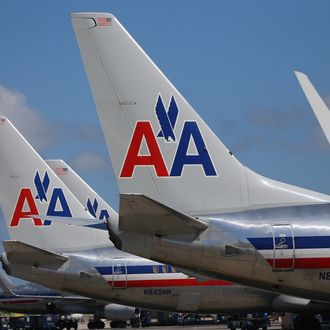
US Airways has been wooing American Airlines for the last year, and on Thursday, the boards of both airlines finally approved the merger. The deal, which airline consultant Paul Sterbenz described as “an example of the little fish swallowing the big fish,” would involve US Airways, a company that was cobbled together over the years from several regional airlines, partnering with the much larger but bankrupt American Airlines. According to the Washington Post, the merger would form the world’s largest air carrier, leaving 86 percent of domestic air travel under the control of American, United, Delta, and Southwest.
The deal, which will be formally announced on Thursday, will need to be approved by American’s bankruptcy judge, US Airways shareholders, and the Justice Department’s antitrust division. In 2001, United Airlines and US Airways dropped plans for a merger after the Justice Department said it would try to block the deal on the grounds that it would reduce competition, raise fares, and hurt consumers. However, federal regulators are expected to approve the new merger, since American Airlines and US Airways only have about a dozen overlapping routes.
Of course, the biggest question for consumers is what effect the merger will have on the generally miserable flying experience. Kevin Mitchell, chairman of the Business Travel Coalition, tells the New York Times that it will lead to “reduced competition, higher fares and fees and diminished service to small and midsize communities.” Experts who spoke to the Post countered that there would be little overall impact on airfares. “I think that we’re seeing a dynamic already where the airlines are passing on the increased cost of fuel and labor to the consumer. I’m not prepared to see egregious gouging by the airline industry just because of this merger,” said William S. Swelbar, a researcher at the MIT International Center for Air Transportation.
Others say there might be some benefits for fliers. The merger will likely bring an end to the recent era of airline consolidation, which saw Delta buy Northwest and United merge with Continental. “It has economic benefits for a country to be able to have a stable airline industry,” said Joshua Schank, president of the nonprofit Eno Center for Transportation. “That may outweigh the slight increase in fares, and, historically, fares are still low, and more people are flying.” Seth Kaplan, an analyst for Airline Weekly, tells USA Today that while the cost of flying might go up slightly, that stability will allow airlines to invest in things like in-flight entertainment and roomier seats in premium cabins. “For years U.S. airlines were just trying to get through the day,” he says. “They didn’t have money for those types of things.” So the general consensus seems to be that fares are going up a bit, but there might be some minor perks. Anyone who isn’t happy about that is free to take their next cross-country trip on Greyhound.






























